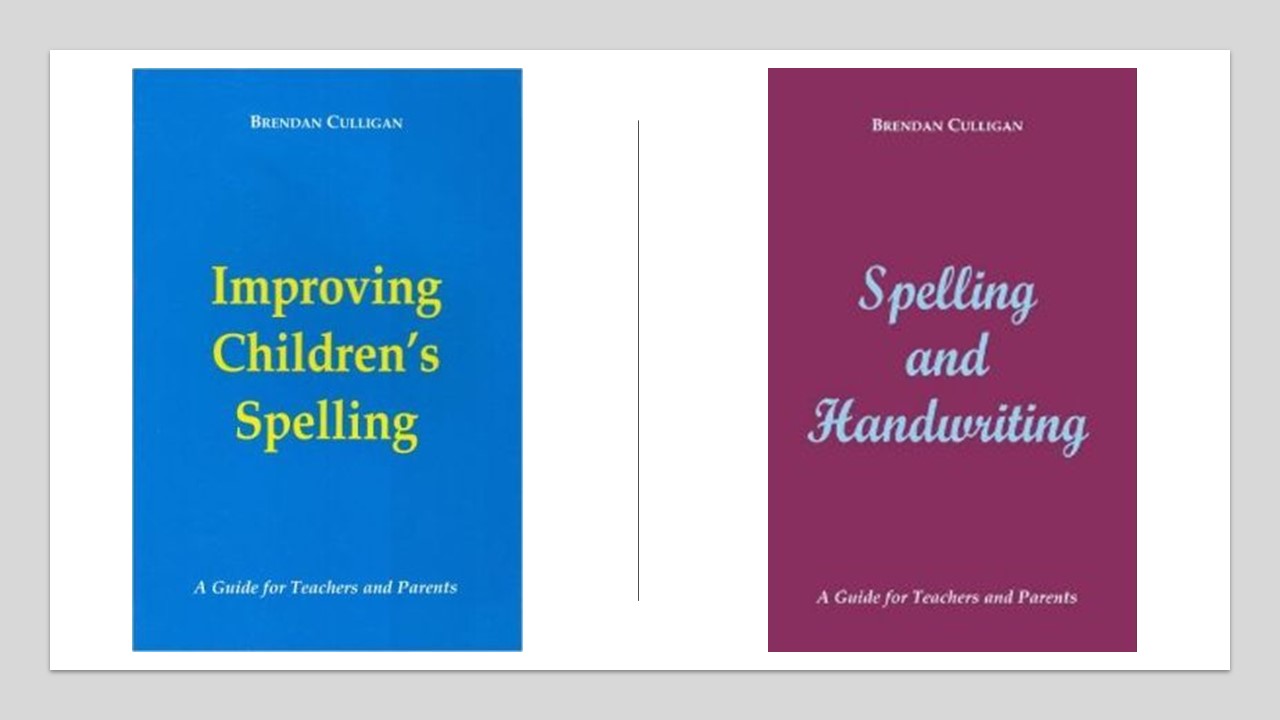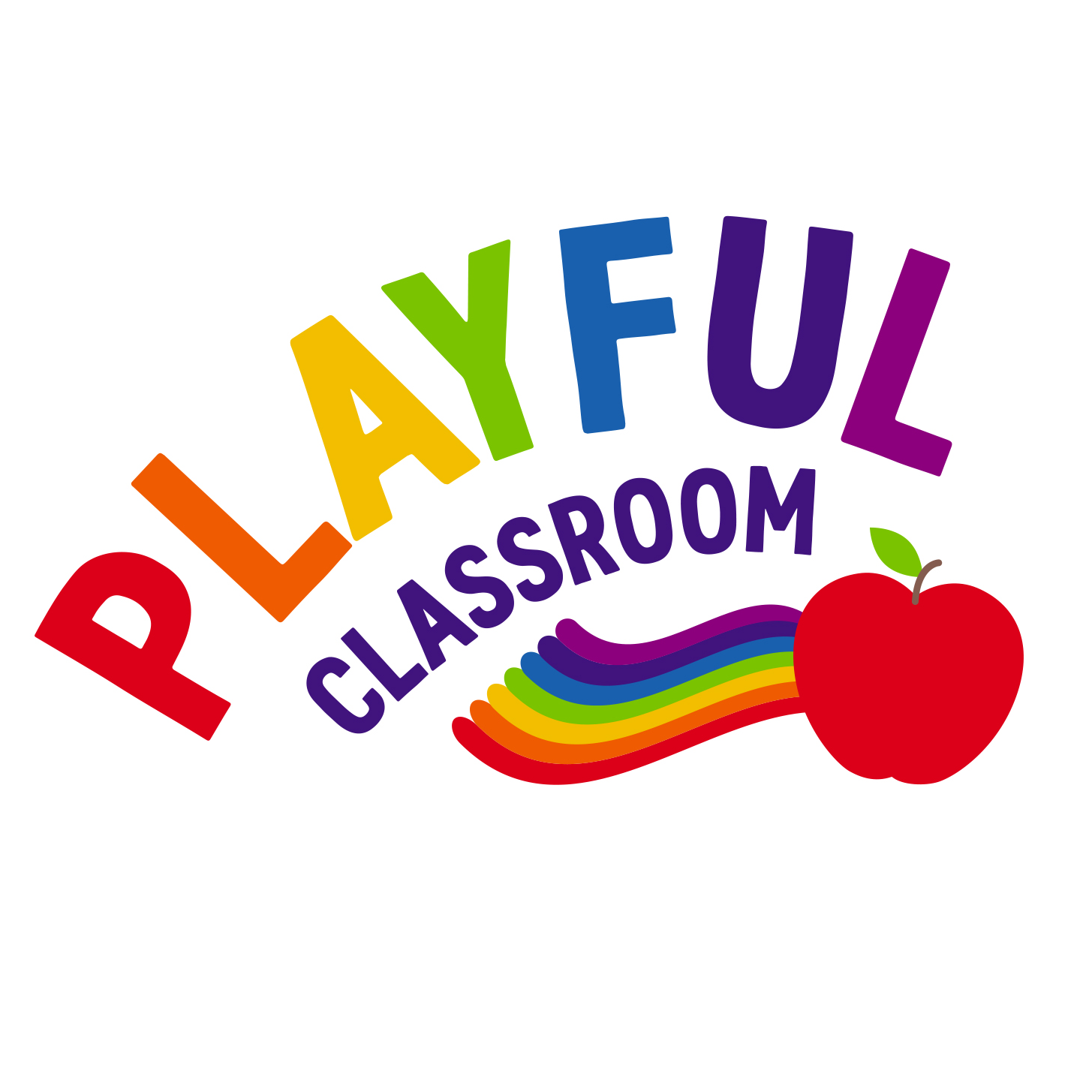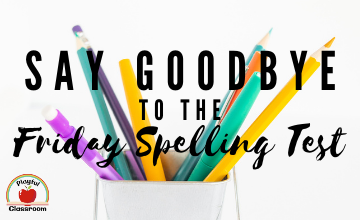Say Goodbye to the Friday Spelling Test!
Most of us know that there’s no benefit to a Friday Spelling Test; there have been many studies to prove it, yet the practice still continues! We find ourselves presenting the children with a list on a Monday and telling them to ‘learn’ them by Friday. Spelling is a very specific skill and abilities will vary hugely in any class. Higher achievers may already know most of the words on the list, and lower achievers will struggle. What ‘teaching’ is involved in this age-old practice?
Is there an alternative?
Say goodbye to the stress of the Friday test, say hello to effective teaching and learning of spellings.
If you have found yourself with a Spelling Workbook for your class but would like to move away from a traditional 'one size fits all' approach, then fear not, because there is a way. Last summer, I found myself preparing to teach 5th class, and yet again with a Spelling Workbook on my booklist. I returned to Brendan Culligan’s books (see below) in a quest to make a plan for the year.

This is what I came up with and it worked well for my class and I this year. The children retained their spellings and were very positive about their learning. No scores, no stress.
Sample Weekly Plan
I recommend a 'mini-lesson' on spellings each day over the course of a week. This can be time-consuming, but you could do an intensive block of Spellings for a term, or every second or third week. You may not cover as many words as you would with a 'weekly list' but the children will retain the spellings better and learn invaluable strategies.
Monday - Blind Test
Give the children a 'blind' test on the weekly spelling list from their workbook. Call out the list of words and have the children write them down, as you would with a traditional 'Friday test'. The difference is, the children have not studied or learnt these words, or even looked at the list prior. The purpose of this blind test is for each child to find out what words they need to learn that week. This is your differentiation within the generic list. The children highlight the words they had mistakes in in their workbook, and write their own list of words in their copy. A designated 'Spellings Copy' may be useful. If a child has a large number of words to learn, you can instruct them to pick out a certain number of them, at your discretion.
Note: I prefer to refer to the words the children need to learn as 'words they had mistakes in' rather than 'incorrect' or 'words they got wrong'. Often, their spelling mistakes may only be one or two letters incorrect or transposed rather than the entire word being 'wrong'.
Tuesday - Dictionary Work
As a class, pick out some interesting words from the list and look them up in the Dictionary. There is absolutely no point learning how to spell a word if you don't know what it means! Have the children put the words into sentences orally. Give the children some time to look up their own words in their dictionaries, and write the definitions in their copies if you wish. They may also put these words into written sentences if time allows or even as a homework assignment.
Wednesday - The Visual Approach
This is where you get down to the nitty-gritty of teaching and learning how to spell. Brendan Culligan is an advocate of a visual approach to learning spellings, and decades of research supports this. The children will need instruction in these methods through teacher modelling. As a class, look at some of the words that the children had mistakes in . (They will readily volunteer their own ones!) Look for words with the words, common letter strings and patterns and mnemonics. Make spelling pictures. Write consonants in one colour and vowels in another. Write 'spelling staircases' and 'scrabble' layouts with the words. Draw the shape around the word. You can find more information on these methods in Brendan Culligan's books or in the Spellings for Me video below. Give the children time to work on their own words in their copies using these methods.
<iframe width="560" height="315" src="https://www.youtube.com/embed/0YxLs4d7DmA"; frameborder="0" allow="accelerometer; autoplay; clipboard-write; encrypted-media; gyroscope; picture-in-picture" allowfullscreen></iframe>
Thursday/Friday - Dictation Sentences and more time on Visual Spelling Activities
Prepare some dictation sentences using the words that the children are working on. Try to include revision of spelling words that the children have worked on previously. This is not a test. This is an opportunity for the children to see the words used in context. You may use this activity as an opportunity to assess the children's learning of the words but do not give a 'score' or 'corrections'. Give the children time to work on the words they had mistakes on by using the visual methods previously outlined. Give the children some choice in terms of which method they would like to use, but you could also include activities such as cloze procedures, make your own wordsearch or using words into a short story. Make time to revise words from previous weeks, especially words that many of the children had mistakes in. Encourage the children to look out for common letter strings and patterns that reoccur.
Note: When giving dictation sentences, instruct the children to listen while you read the sentence TWICE, before putting pen to paper.
Assessment
Try to avoid the traditional 'Friday Test', which is only a test of short-term memory rather than an assessment of spelling skills or improvement. The best way to assess children's spellings is by looking at their free writing. That said, sometimes you need something more tangible or a 'score' to give parents. Multiple choice tests, dictation sentences and paragraphs, 'spot the mistake' and cloze procedures can be effective methods of assessment once a month or once a term.
I you are teaching 2nd, 3rd, 4th, 5th or 6th Class, and you are lucky enough not to have a Spelling Workbook on your booklist, then I urge you to consider signing up for the 'Spellings for Me' programme. It has been designed by two Irish teachers and provides a tailor-made spelling programme for each child in your class.

Playful Classroom is not affiliated with Spellings for Me or Brendan Culligan.
Is there an alternative?
Say goodbye to the stress of the Friday test, say hello to effective teaching and learning of spellings.
If you have found yourself with a Spelling Workbook for your class but would like to move away from a traditional 'one size fits all' approach, then fear not, because there is a way. Last summer, I found myself preparing to teach 5th class, and yet again with a Spelling Workbook on my booklist. I returned to Brendan Culligan’s books (see below) in a quest to make a plan for the year.

This is what I came up with and it worked well for my class and I this year. The children retained their spellings and were very positive about their learning. No scores, no stress.
Sample Weekly Plan
I recommend a 'mini-lesson' on spellings each day over the course of a week. This can be time-consuming, but you could do an intensive block of Spellings for a term, or every second or third week. You may not cover as many words as you would with a 'weekly list' but the children will retain the spellings better and learn invaluable strategies.Monday - Blind Test
Give the children a 'blind' test on the weekly spelling list from their workbook. Call out the list of words and have the children write them down, as you would with a traditional 'Friday test'. The difference is, the children have not studied or learnt these words, or even looked at the list prior. The purpose of this blind test is for each child to find out what words they need to learn that week. This is your differentiation within the generic list. The children highlight the words they had mistakes in in their workbook, and write their own list of words in their copy. A designated 'Spellings Copy' may be useful. If a child has a large number of words to learn, you can instruct them to pick out a certain number of them, at your discretion. Note: I prefer to refer to the words the children need to learn as 'words they had mistakes in' rather than 'incorrect' or 'words they got wrong'. Often, their spelling mistakes may only be one or two letters incorrect or transposed rather than the entire word being 'wrong'.
Tuesday - Dictionary Work
As a class, pick out some interesting words from the list and look them up in the Dictionary. There is absolutely no point learning how to spell a word if you don't know what it means! Have the children put the words into sentences orally. Give the children some time to look up their own words in their dictionaries, and write the definitions in their copies if you wish. They may also put these words into written sentences if time allows or even as a homework assignment.Wednesday - The Visual Approach
This is where you get down to the nitty-gritty of teaching and learning how to spell. Brendan Culligan is an advocate of a visual approach to learning spellings, and decades of research supports this. The children will need instruction in these methods through teacher modelling. As a class, look at some of the words that the children had mistakes in . (They will readily volunteer their own ones!) Look for words with the words, common letter strings and patterns and mnemonics. Make spelling pictures. Write consonants in one colour and vowels in another. Write 'spelling staircases' and 'scrabble' layouts with the words. Draw the shape around the word. You can find more information on these methods in Brendan Culligan's books or in the Spellings for Me video below. Give the children time to work on their own words in their copies using these methods.<iframe width="560" height="315" src="https://www.youtube.com/embed/0YxLs4d7DmA"; frameborder="0" allow="accelerometer; autoplay; clipboard-write; encrypted-media; gyroscope; picture-in-picture" allowfullscreen></iframe>
Thursday/Friday - Dictation Sentences and more time on Visual Spelling Activities
Prepare some dictation sentences using the words that the children are working on. Try to include revision of spelling words that the children have worked on previously. This is not a test. This is an opportunity for the children to see the words used in context. You may use this activity as an opportunity to assess the children's learning of the words but do not give a 'score' or 'corrections'. Give the children time to work on the words they had mistakes on by using the visual methods previously outlined. Give the children some choice in terms of which method they would like to use, but you could also include activities such as cloze procedures, make your own wordsearch or using words into a short story. Make time to revise words from previous weeks, especially words that many of the children had mistakes in. Encourage the children to look out for common letter strings and patterns that reoccur.Note: When giving dictation sentences, instruct the children to listen while you read the sentence TWICE, before putting pen to paper.
Assessment
Try to avoid the traditional 'Friday Test', which is only a test of short-term memory rather than an assessment of spelling skills or improvement. The best way to assess children's spellings is by looking at their free writing. That said, sometimes you need something more tangible or a 'score' to give parents. Multiple choice tests, dictation sentences and paragraphs, 'spot the mistake' and cloze procedures can be effective methods of assessment once a month or once a term.I you are teaching 2nd, 3rd, 4th, 5th or 6th Class, and you are lucky enough not to have a Spelling Workbook on your booklist, then I urge you to consider signing up for the 'Spellings for Me' programme. It has been designed by two Irish teachers and provides a tailor-made spelling programme for each child in your class.

Playful Classroom is not affiliated with Spellings for Me or Brendan Culligan.


